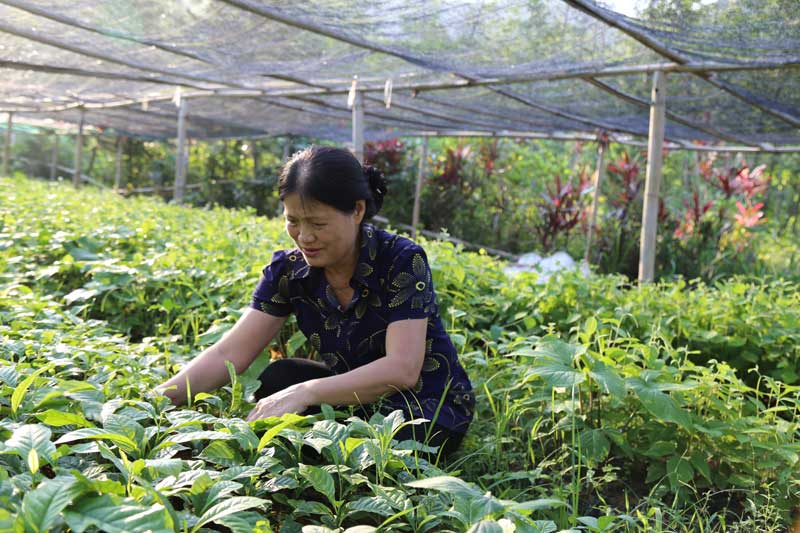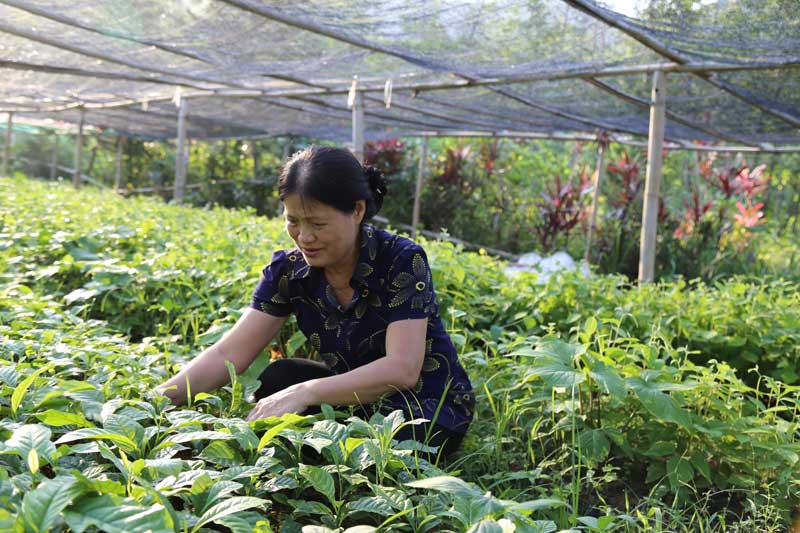
(HBO) – Ms. Nguyen Thi Tam, Tan Thinh ward (Hoa Binh city) already established Phuong Huyen Seedling Production and Trading Limited Company, which brings high economic efficiency and creates more jobs for many local laborers.
After many efforts and research, Ms. Tam has
invested in building a seedling nursery farm with more than 2 hectares,
producing nearly 1 million seedlings per year.
Not stopping with the supply of plant
seedlings, Ms. Tam has developed a production in chain with quality assurance
consumer – oriented products. At
present, with a closed process from breeding, inter- production and product
consumption certainty, Phuong Huyen Company of Ms. Tam has launched a series of
high quality Shan tea, Jiaogulan tea, cucumber tea. Particularly, with Shan
tea, after successful breeding research, the company provided tea seedlings to
the local people of Pa Co commune (Mai Chau) and Trung Thanh commune, Yen Hoa
commune (Da Bac) with the area of nearly 300 hectares for farmers to develop
production. Along with that, the company built two processing factories in Pa
Co commune and Yen Hoa commune, collecting 300-400 tons of fresh buds,
contributing to increase income and create jobs for more than 100 local
workers.

Ms. Nguyen Thi Tam, Director of Phuong Huyen
Seedling Production Co., Ltd, is one of the typical elderly members in
excellent production and business.
Recently, Ms. Tam continued to build a farm
to plant oranges and organic grapefruit to research and launch into the market
the products of food hygiene guarantee and safety with high quality. In the
orange season in 2017, her family gained a revenue of more than 1 billion VND.
The company owned by Ms. Tam was honored to
receive the Cup of "For the development of the community for the ethnic
minorities in Vietnam and the top 100 gold trademarks of Vietnam
Agriculture".
According to data from the Hoa Binh Provincial Party Committee, the industrial production index for the first six months of 2025 is estimated to have increased by 20% compared to the same period last year. This marks the highest year-on-year growth rate for this period since 2020.
In the first six months of 2025, Hoa Binh province’s export turnover was estimated at 1.145 billion USD, marking an 18.11% increase compared to the same period in 2024. Import turnover was estimated at $ 804 million, a 17.15% increase, which helped the province maintain a positive trade balance.
The lives of the ethnic minority farmers in Tan Lac district have gradually improved thanks to the new directions in agricultural production. This is a testament to the collective strength fostered through the professional associations and groups implemented by various levels of the district’s Farmers’ Union.
With the motto the "product quality comes first,” after nearly one year of establishment and operation, Muong village’s Clean Food Agricultural and Commercial Cooperative, located in Cau Hamlet, Hung Son Commune (Kim Boi district), has launched reputable, high-quality agricultural products to the market that are well-received by consumers. The products such as Muong village’s pork sausage, salt-cured chicken, and salt-cured pork hocks have gradually carved out a place in the market and they are on the path to obtaining the OCOP certification.
In the past, the phrase "bumper harvest, rock-bottom prices" was a familiar refrain for Vietnamese farmers engaged in fragmented, small-scale agriculture. But today, a new spirit is emerging across rural areas of Hoa Binh province - one of collaboration, organisation, and collective economic models that provide a stable foundation for production.
Maintaining growing area codes and packing facility codes in accordance with regulations is a mandatory requirement for agricultural products to be eligible for export. Recently, the Department of Agriculture and Environment of Hoa Binh province has intensified technical supervision of designated farming areas and packing facilities to safeguard the "green passport" that enables its products to access international markets.



